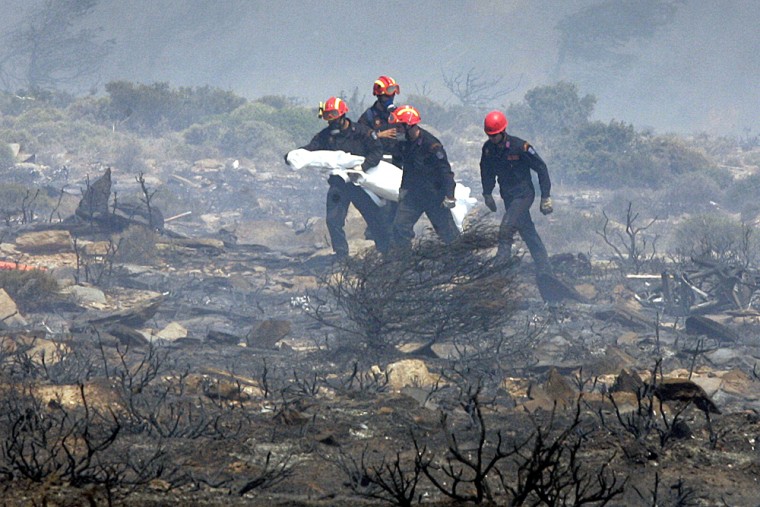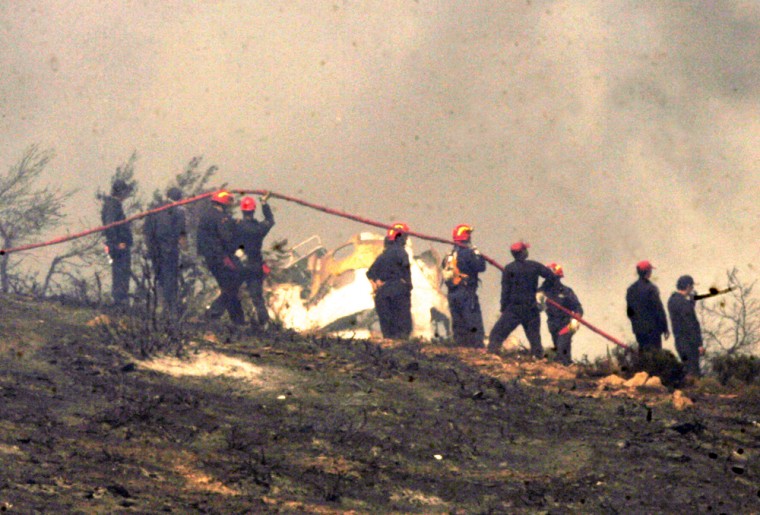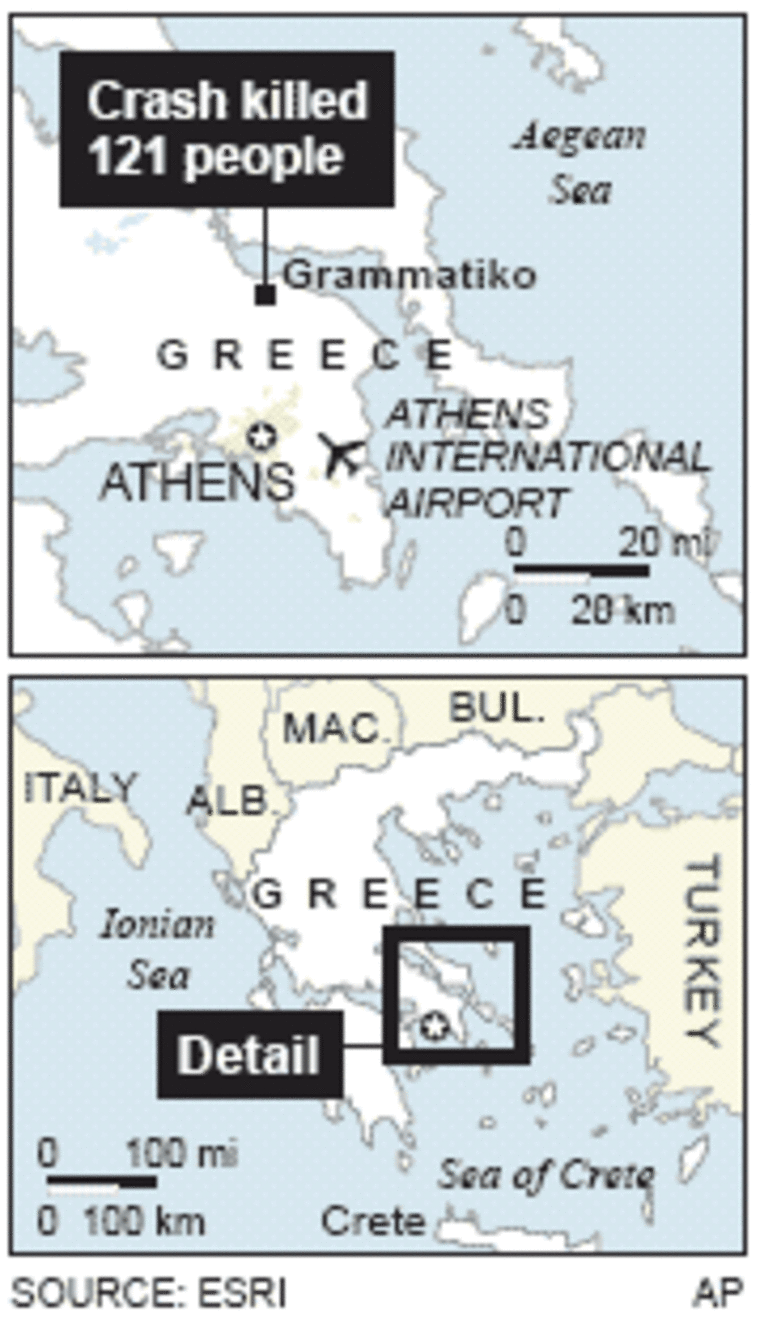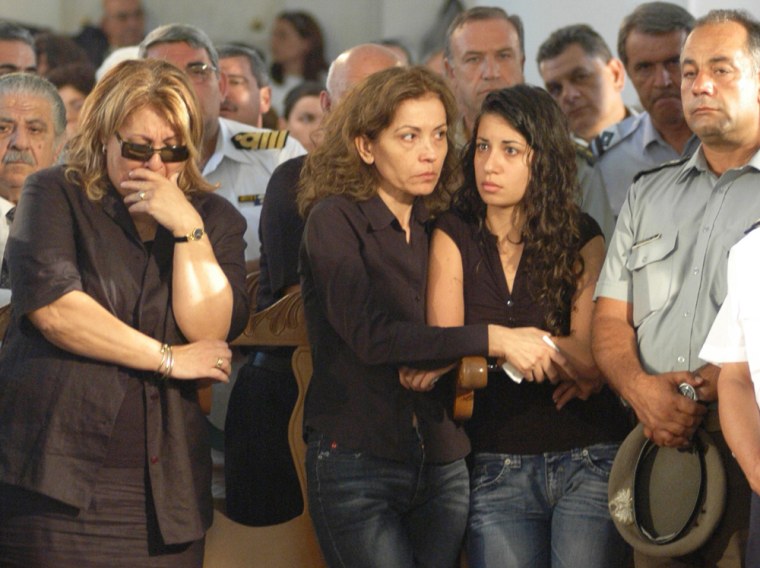Investigators trying to determine why a Cypriot airliner carrying 121 people crashed in the Greek mountains focused on reports of past technical problems, with a former mechanic for the airline saying Tuesday the jet lost cabin pressure during a flight last year.
A former chief mechanic for Helios, Kyriakos Pilavakis, said the plane lost cabin pressure during a December flight after a door apparently was not sealed properly.
“It was a flight from Warsaw.... The indications were that air had escaped from one of the doors — the right door on the rear,” Pilavakis told Greece’s state-run NET television.
Pilavakis, who said he resigned from the airline in January, gave six hours of testimony to Cyprus investigators, who have seized maintenance records and other documents from Helios.
But Helios managing director Dimitris Pantazis insisted the plane was airworthy.
“I understand the pain and grief felt across Cyprus,” he said. “Safety was always our first priority. This was never compromised for the sake of profit.... We must stop speculation and let the experts do their work.”
Co-pilot was alive The autopsy on the body of the co-pilot shows he was alive when the plane went down north of Athens, Athens' chief coroner said Tuesday.
Fillipos Koutsaftis told The Associated Press that co-pilot Pambos Haralambous was alive when the Helios Airways plane crashed Sunday. There were no survivors.
Pilots of two Greek F-16 fighter jets that intercepted the plane after it lost contact with Greek air traffic controllers had reported seeing the co-pilot slumped over the controls in the cockpit, apparently unconscious, shortly before the plane crashed. They said the plane's German pilot was not in the cockpit.
Recording device lost
Earlier Tuesday, officials said they had found only the exterior container of the cockpit voice recorder from the crashed plane, hampering investigative efforts into the accident’s cause.
The device’s internal components were ejected from the container when the plane crashed on Sunday, said Akrivos Tsolakis, the head of the Greek airline safety committee.

“The only fortunate event in the investigation is that we have the flight data recorder,” Tsolakis said, adding that the box would be flown to Paris on Wednesday for decoding.
He said a group of investigators would search for the rest of the voice recorder. He said American experts, including a representative of the plane’s manufacturer, were providing assistance.
The voice recorder picks up any conversation inside the cockpit but records only the last 30 minutes of sound. Because the airplane appeared to have been flying disabled for several hours, it wasn’t clear how useful any recovered conversations would be for investigators.
Many passengers alive at time of crash
Autopsy results indicated that dozens of people, including the co-pilot and a flight attendant, were alive when Helios Airways Flight ZU522 crashed Sunday.
Autopsies have been performed on the 26 bodies identified by relatives, including those of co-pilot Haralambous and chief flight attendant Louiza Vouteri, which were found close together near the cockpit wreckage, Koutsaftis said.
The autopsy results showed all 26 were alive — but not necessarily conscious — when the plane crashed The Helios Airways Boeing 737-300, with six crew and 115 passengers, plunged 34,000 feet into a mountainous area near the village of Grammatiko, 25 miles north of Athens.
Koutsaftis and his team of coroners had carried out about 13 autopsies by Tuesday morning. They had only released the results of the first six autopsies and were preparing to examine the body of co-pilot Pambos Haralambous.
In Cyprus, police raided the offices of Helios Airways in the coastal city of Larnaca, near the international airport.
A search warrant was issued “to secure ... documents and other evidence which could be useful for the investigation into possible criminal acts,” Cyprus’ deputy presidential spokesman Marios Karoyian said.
Investigators also were trying to determine why the pilot was not in his seat shortly before the crash.
The pilots of two Greek air force F-16 fighter planes scrambled to intercept the plane after it lost contact with air traffic control shortly after entering Greek airspace said they saw the co-pilot slumped over the controls. The pilot did not appear to be in the cockpit, and oxygen masks were seen dangling in the cabin.
The fighter jet pilots also saw two people possibly trying to take control of the plane; it was unclear if they were crew members or passengers.
The plane might have run out of fuel after flying for nearly three hours on autopilot, air force officials said, asking not to be named in line with Greek practice.
After the crash, authorities said it appeared to have been caused by a technical failure — resulting in high-altitude decompression. A Cypriot transport official had said Sunday the passengers and crew may have been dead before the plane crashed.
Search for pilot's body
Searchers were still looking for three bodies, including the plane’s German pilot, fire officials said. Cypriot authorities identified him as Marten Hans Jurgen, 50, from Berlin.
A spokesman for the German Foreign Ministry, speaking on condition of anonymity in line with German practice, identified one of the pilots as a 58-year-old German but would not give his full name. It was unclear why there was a discrepancy in his age. Greek and Cypriot authorities often list surnames before given names, and Hans-Juergen would likely be the pilot’s first name.

In Berlin, police were guarding the house at the address where the Cypriot government said the pilot lived — a gray stucco house surrounded by a tidy, tree-filled garden in a quiet Berlin neighborhood near the Schoenefeld airport.
The name on the mailbox said Merten. Neighbors confirmed his first name was Hans-Juergen and said he was a pilot in his 50s, but refused to provide any other details.

The airliner’s pilots had reported air conditioning system problems about a half-hour after takeoff, and Greek state TV quoted Cyprus’ transport minister as saying the plane had decompression problems in the past.
But a Helios representative said the plane had “no problems and was serviced just last week.”
A man who claimed to have received a telephone text message from a passenger on the plane faced a preliminary hearing Tuesday for disseminating false information and causing a public disturbance.
Police on Monday arrested Nektarios-Sotirios Voutas, 32, who had called Greek television stations shortly after the crash. He claimed a cousin on board had sent him a cell-phone text message saying: “Farewell, cousin, here we’re frozen.”
The report that the plane was cold was taken as a sign of decompression — one of the possible explanations authorities have given for the crash. But police said they determined the suspect’s story was false.
